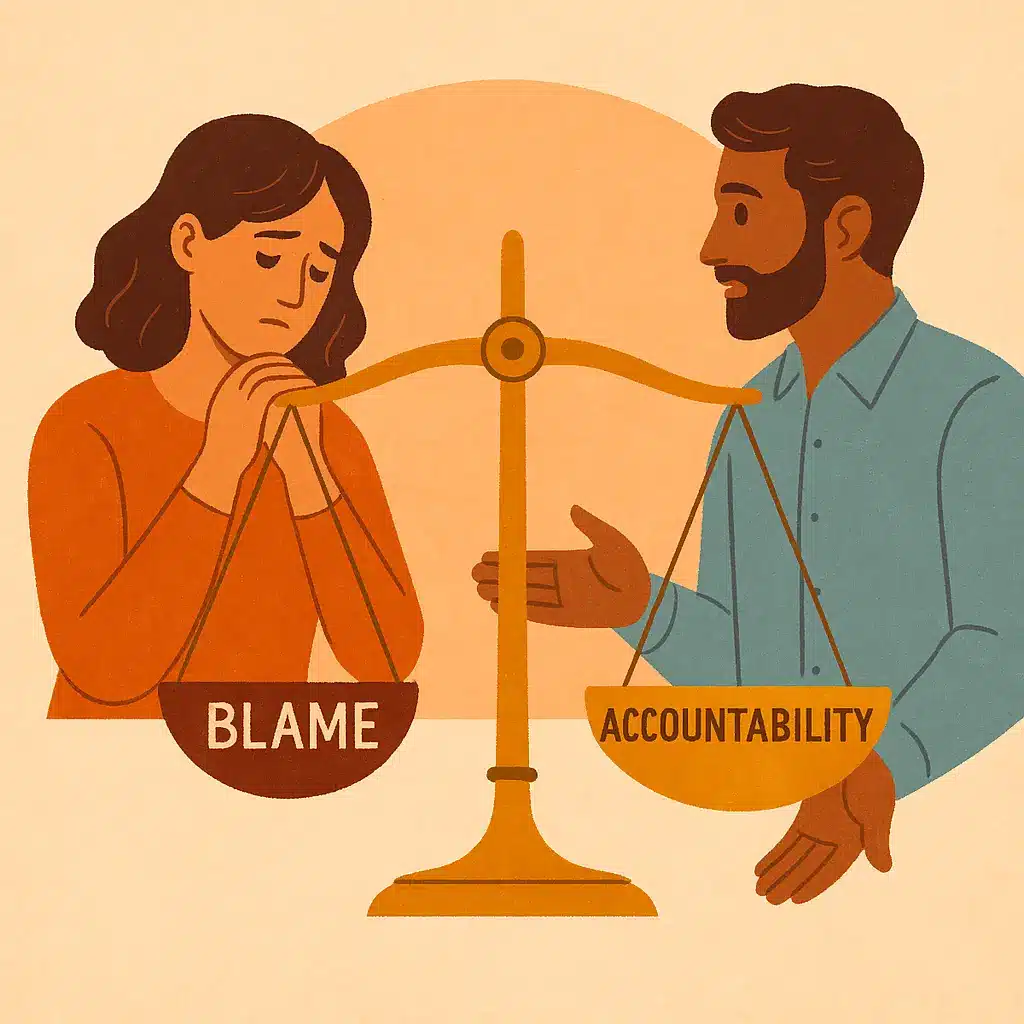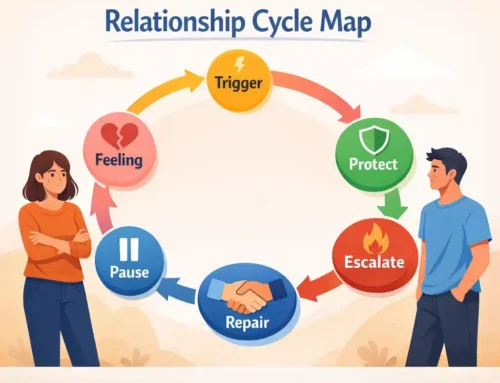
Approx. read time: 7.9 min.
Post: 5 Reasons Why Women Often Shoulder the Blame in Relationships—and How to Rebalance the Scales
Why Women Blame Themselves in Relationships. In many partnerships, when conflicts flare or the relationship hits a rough patch, it’s not unusual to see one partner assume primary responsibility for what “went wrong.” More often than not, that role falls to women. This pattern isn’t about intrinsic weakness or a secret feminine flaw. It’s rooted in how society shapes expectations, how emotional work gets divvied up, and how communication habits develop over time. Understanding these forces is the first step toward fairer sharing of both credit and accountability—and toward healthier, more honest connections.
1. Socialization and Gender Roles – Why Women Blame Themselves in Relationships
From the earliest stages of childhood, girls and boys are taught vastly different “scripts” about how to behave in relationships. These lessons, often invisible and unspoken, shape how individuals later handle conflict, communication, and responsibility in adulthood.
Caretaker Training
For many girls, the path to approval is paved with kindness, accommodation, and emotional attentiveness. They are praised for being “sweet,” “helpful,” or “easygoing,” while boys may be rewarded for assertiveness or independence. This reinforcement quietly teaches girls that harmony equals virtue—and that their role is to protect it at all costs. As a result, many women grow up believing that keeping the peace is not just desirable, but their duty.
Conflict Framing
The contrast becomes even clearer in moments of disagreement. While boys who push back may be told they are “strong-willed” or “standing up for themselves,” girls often encounter disapproval for showing anger or demanding fairness. The same traits that earn boys respect can earn girls criticism. Over time, women internalize the expectation that their reactions should be measured, pleasant, and self-controlled. When conflict arises, the automatic response becomes, “What did I do wrong?” rather than, “What’s happening between us?”
Self-Policing and Internalized Scripts
These early social lessons do not disappear in adulthood—they become part of an internal voice that constantly monitors behavior. That voice whispers questions like, “Did I upset them? Was I too harsh? Am I overreacting?” Instead of seeing conflict as a shared dynamic, women are often trained to see it as a reflection of their own shortcomings. Subtle cultural reminders—“Don’t rock the boat,” “Be accommodating,” “Make others comfortable”—condition women to self-police their emotions and words.
The Burden of Responsibility
Because society rewards women for being relationship-keepers, it also positions them as the linchpin when things go wrong. When a partnership struggles, women are far more likely to ask themselves, “What did I mess up?” instead of questioning the balance of effort or accountability on both sides. This pattern reinforces the idea that women are responsible not just for their own behavior, but for the emotional tone of the entire relationship.
In this way, socialization and gender roles plant the seeds of self-blame long before women even enter their first serious relationship. The cultural script makes self-doubt feel natural, almost inevitable, even though the responsibility for harmony should always be shared equally.
2. Emotional Labor and Relationship Maintenance – Why Women Blame Themselves in Relationships
Emotional labor is the invisible work that keeps a relationship running smoothly—and studies show women do far more of it.
- Mental Load: Remembering anniversaries, noticing mood swings, planning weekend plans—women often handle these tasks without fanfare. That mental checklist of “what keeps us connected” becomes part of their identity.
- Emotional Monitoring: Spotting tension, defusing arguments, and offering comfort all demand constant vigilance. When you’re on emotional watch 24/7, any sign of trouble can feel like an alarm you set off yourself.
- Burnout and Guilt: Doing the lion’s share of this work creates a pressure cooker. When the relationship sputters, burn-out amplifies self-criticism: “If I’d been more on top of things, we wouldn’t be here.”
This imbalance doesn’t just stack more tasks on women; it rewires how they experience problems. Their default posture becomes “repair mode,” which looks like self-blame even when issues stem from both sides.
3. Communication Styles and Conflict Aversion – Why Women Blame Themselves in Relationships
How people talk through problems often depends on social expectations as much as personality.
- Tentative Language: Phrases like “I’m sorry, but…” or “Maybe I’m overreacting” are common conflict starters for women. They soften the blow—but they also signal that the speaker owns the fault.
- Indirect Feedback: Rather than saying bluntly, “You hurt me when you did X,” many women drop hints or pose questions, hoping their partner will read between the lines. If the hint doesn’t land, it loops back into “Well, maybe it really was me.”
- Nice-Girl Trap: Cultural pressure to be “pleasant” means directness can get labeled as “rude.” As a result, women learn to frame critiques as admissions of personal failure rather than valid grievances.
Over time, these patterns condition women to default to self-critique. The real question—“How can we communicate better?”—gets buried under a mountain of rhetorical apologies.
4. Fear of Abandonment and Relationship Investment – Why Women Blame Themselves in Relationships
For many women, relationships aren’t just a part of life—they’re central to self-worth and security.
- Value Messaging: From fairy tales to real-life feedback (“Your happiness starts with being in a partnership”), women receive the message that their value ties closely to the health of their relationships.
- Risk Aversion: Saying “You hurt me” feels risky if the alternative is admitting “I’m sorry,” which at least promises to smooth things over. Self-blame can act like a confession that buys safety, even at the cost of self-respect.
- Identity Stakes: If you’ve invested emotional energy, time, and vision of a shared future, admitting that the relationship is flawed—or that your partner might be at fault—becomes a threat to your own identity narrative: “I chose this. I believed in us.”
These fears make taking any stance that might rock the boat feel dangerous. Blaming yourself usually feels less threatening than challenging your partner’s behavior.
5. Shifting the Dynamic: Practical Steps – Why Women Blame Themselves in Relationships
Rebalancing blame and building shared responsibility takes intention. Here are concrete moves couples can try:
- Establish “Fairness Check-Ins”
- Sit down weekly for 15 minutes.
- Each partner names one thing that’s going well and one thing that’s troubling.
- Use “we” language: “We haven’t been on the same page about finances” instead of “You’re bad with money” or “I always mess up the budget.”
- Divide the Emotional Labor
- List all the “invisible tasks”: birthdays, dinner planning, emotional updates, extended-family coordination.
- Split them intentionally. Rotate roles so neither partner does all the work.
- Practice Direct, Compassionate Feedback
- Follow the “Tell-Show-Request” formula:
- Tell: State the action (“When you interrupt me…”)
- Show: Explain the impact (“…I feel unheard.”)
- Request: Ask for change (“Would you pause and let me finish first?”)
- This frames issues as mutual problems, not personal failings.
- Follow the “Tell-Show-Request” formula:
- Normalize “It’s Not Your Fault” Moments
- When conflict arises, resist the urge to self-flagellate.
- Agree as a couple to say, “No blame. Let’s find solutions.”
- This breaks the guilt cycle and opens space for true accountability.
- Enlist Outside Support Early
- Couples therapy isn’t a last resort.
- A therapist can help map out who carries what load—and guide both partners toward equitable patterns.
- Build Individual Confidence
- Encourage each other’s personal growth—hobbies, friendships, solo time.
- Stronger self-esteem buffers fear of abandonment and makes blaming yourself less automatic.
Conclusion – Why Women Blame Themselves in Relationships
Self-blame in relationships is rarely the result of “low confidence” alone. Instead, it is the outcome of a tangled web of social conditioning, gendered expectations, unbalanced emotional labor, and the quiet fear of abandonment that many women carry. From childhood messaging about being “the peacemaker,” to the unspoken rule that women must handle emotional maintenance, the tendency to turn inward and assume fault is learned—and reinforced—over years of lived experience.
Recognizing this reality is the first step toward change. Once couples acknowledge that self-blame is not a personal flaw but a patterned response, they can begin to rebalance responsibility. Dividing invisible tasks, naming emotions directly, and creating space for fair conflict resolution allow both partners to share the emotional weight of the relationship. Over time, this shift replaces guilt-driven reactions with clarity, empathy, and healthier communication.
For women, resisting the reflex to internalize blame requires practice and support. Building confidence through hobbies, friendships, therapy, and personal growth creates an inner foundation that does not collapse under relationship strain. For men and partners, it requires awareness of how often the burden of harmony falls unfairly on one side—and the willingness to step in as an equal emotional contributor.
Ultimately, when both partners learn to pause, resist the cycle of automatic self-blame, and replace it with honest dialogue, the relationship transforms. Respect becomes mutual, conflicts become growth opportunities, and love deepens—not because one partner carried the weight alone, but because the responsibility was shared. In the end, the healthiest partnerships thrive when accountability and credit land exactly where they belong: evenly, respectfully, and lovingly on both sides.
Related Videos:
Related Posts:
Personality Types of Women in Relationships
The Importance of Defining Roles Before Marriage: Advice I Wish My Parents Had Taught Me
The Importance of Having an Accountability Partner in Health and Fitness
Why Do Mothers Get Blamed for Everything That Goes Wrong in a Family?










